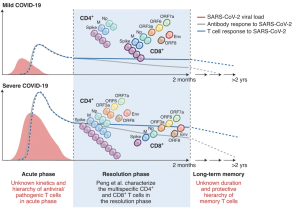
Peng et al. studied the resolution phase of COVID-19 (blue box), showing a broadly targeted CD4+ and CD8+ T cell response (cell colors and numbers represent relative frequencies of indicated protein specificities). The total T cell response (solid blue line) is stronger and broader in severe cases (assumed to have had higher viral burden, red curve), correlating with stronger antibody responses (solid gray line). However, there are, proportionally, more CD8+ T cells in mild disease. Central questions arising from this study (listed in red) concern the unknown hierarchy and kinetics of T cells (dashed blue lines) and antibodies (dashed grey lines) in the acute and memory phases. (Source: Swadling & Maini 2020 Nat Immunology)
A recent study published in Nature Immunology shows the presence of SARS-CoV-2 specific memory T cell responses in patients recovered from COVID-19. The breadth and strength of SARS-CoV-2-specific T cell responses were higher in patients with more severe disease, which the authors postulate could be a result of higher viral loads or infecting inoculum. There was a high frequency of spike protein-specific CD4+ T cell responses in patients who had recovered from COVID-19. Six immunodominant epitope-specific regions were frequently targeted by recovering patients: three in the spike protein, two in membrane protein and one in the nucleocapsid protein (NP). Although there were higher CD4+ T cells in patients with severe disease, there was a higher proportion of CD8+ T cell responses in those with mild disease, which the authors suggest was “a potential protective role of CD8+ T cell responses in mild disease”. The majority of these epitope-specific memory CD8+ T cells were of the effector, central or early/intermediate differentiation phenotypes and there was a higher proportion of multi-cytokine-producing CD8+ T cells recognizing epitopes in M and NP proteins compared with spike. The authors conclude that “non-spike dominant CD8+ T cell epitopes suggests the potential importance of including non-spike proteins such as NP, M and ORFs in future vaccine designs.”
Journal Article: Peng et al., 2020. Broad and strong memory CD4+ and CD8+ T cells induced by SARS-CoV-2 in UK convalescent individuals following COVID-19. Nature Immunology
Summary by Clive Gray










